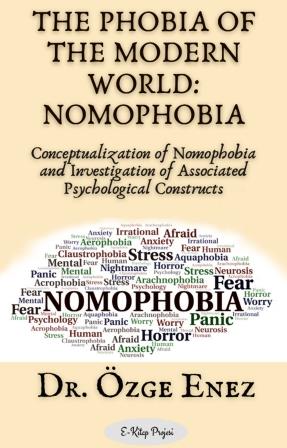
The Phobia of the Modern World: Nomophobia
Conceptualization of Nomophobia and Investigation of Associated Psychological Constructs
More Search Results...

Conceptualization of Nomophobia and Investigation of Associated Psychological Constructs
PREFACE
In the modern world, the mobile phone has become an indispensable part of modern life. On the one hand, the mobile phone allows maintaining interpersonal contacts and fulfilling work or school duties regardless of time and location.
It enables individuals to plan their daily routines and their free times. On the other hand, a mobile phone is a tool that can cause several psychological and physical problems. Nomophobia, which is considered the phobia of the modern era, is only one of these problems. In the simplest terms, nomophobia is the fear of being without a mobile phone and the intense anxiety and distress experienced in the absence of a mobile phone. Although technological addictions such as smartphone addiction and internet addiction have been studied extensively in the psychology literature, it is striking that nomophobia is a neglected psychological problem. However, nomophobia is emerging as a common phenomenon among young adults, as most young adults use the mobile phone for about 5 hours a day. Some users define the mobile phone as a friend and the meaning of life. More importantly, prevalence studies have revealed that about half of young adults suffer from nomophobia. Since nomophobia causes many serious consequences such as physical pain, social problems and a decrease in academic achievement, nomophobia studies are important and beneficial especially for the younger generation.
This book has been written to emphasize the importance of nomophobia and to provide detailed information about the diagnosis, treatment, prevalence, predictors and symptoms of nomophobia. In addition, this book aimed to conceptualize nomophobia theoretically. Also, based on the theoretical conceptualization, psychological structures that can cause nomophobia have been identified. The theoretical conceptualization has been tested and validated using scientific methods. This book, which contains a comprehensive literature review and scientific research, can shed light on researchers for future nomophobia studies. I also believe that this book will make valuable contributions to the clinical field by providing a better understanding of the factors that should be considered in prevention programs and treatment interventions developed for nomophobia. I hope that scholars, clinicians, and students from a variety of disciplines will find my efforts helpful. Lastly, I would like to express my deepest gratitude to my supervisor Prof. Dr. Özden Yalçınkaya Alkar for her constant support, advice, and understanding during my doctoral process.
Dr. Özge ENEZ
CONTENTS
LIST OF ABBREVIATIONS
LIST OF TABLES
CHAPTER 1. INTRODUCTION
1.1. Nomophobia
1.1.1. Definition of Nomophobia
1.1.2. Dimensions of Nomophobia
1.1.3. Diagnostic Criteria of Nomophobia
1.1.4. Prevalence of Nomophobia
1.1.5. Treatment of Nomophobia
1.2. Problematic Phone Use
1.2.1. Mobile Phone Dependence and Nomophobia
1.2.2. Smartphone Addiction and Nomophobia
1.2.3. Fear of Missing Out and Nomophobia
1.3. Previous Studies on Nomophobia
CHAPTER 2. THEORETICAL CONCEPTUALISATION OF NOMOPHOBIA
2.1. Emotion Dysregulation and Nomophobia
2.2. Positive Affect, Negative Affect and Nomophobia
2.3. Boredom Proneness and Nomophobia
2.4. Psychological Symptom Severity and Nomophobia
CHAPTER 3. TESTING THE NOMOPHOBIA MODEL
3.1. Method
3.1.1. Participants
3.1.2. Measurements
3.1.3. Procedure
3.1.4. Statistical Analysis
3.2. Results
3.2.1. Demographic Information Analyses
3.2.2. Correlation Analyses
3.2.3. Regression Analysis
CHAPTER 4. DISCUSSION
4.1. Demographic Characteristics of The Participants and Nomophobia
4.2. Emotion Dysregulation and Nomophobia
4.3. Trait Affect and Nomophobia
4.4. Boredom Proneness and Nomophobia
4.5. Psychological Symptom Severity and Nomophobia
4.6. The Five-Predictor Model and Nomophobia
CHAPTER 5. CONCLUSION
REFERENCES